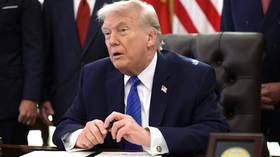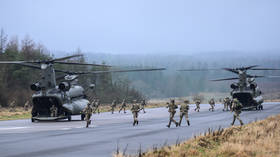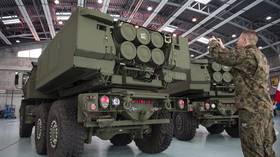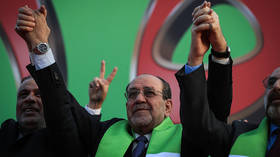Merkel faces test on refugee stance as ‘Super Sunday’ regional elections begin in Germany
Voting booths have opened in Germany, where people are going to the polls in three states in what is widely seen as the biggest electoral challenge for Chancellor Angela Merkel ahead of next year’s general election, and a test of support for her open door migrant policy.
“We can of course see a certain connection between recent developments in immigration policy of the government of Chancellor Angela Merkel, and there's a certain unsatisfaction among the population that shows that this increases the tendency to vote for right-wing parties in Germany,” geopolitical analyst and consultant Reiner Rothfuss told RT.
“We would need different political answers, we need a change to policy in the Middle East, we need an open debate on the problems of immigration. As long as this is not put on the political agenda neither by the established parties nor by new parties as the alternative for Germany, we will not have any long-term solution,” he added.
‘Merkel must go’: Thousands protest pro-refugee policy in Berlin https://t.co/3rvhUTSY4tpic.twitter.com/icgPTpRLJD
— RT (@RT_com) 13 марта 2016 г.
Germany is preparing to allocate tens of billions of euro for migrant accommodation, integration and language lessons in 2016-2017. A forecast prepared by the Cologne Institute for Economic Research estimated that incoming asylum seekers will cost the federal budget about €50 billion (US$54.3 billion) in 2016-2017. This year, Germany could let in some 1.5 million refugees, compared to 1.1 million in 2015.
READ MORE: Asylum seekers to cost Germany €50bn within 2 years – forecast
The mass assaults that saw groups of men, presumably of North African and Middle East origin, sexually harass and rob about 1,000 women in the German city of Cologne on New Year`s Eve sparked outrage across the country, with many demanding punishment for the perpetrators as well as stricter border controls.
A poll of German citizens in early February found that 81 percent of the population feel the refugee crisis is “out of control” under Merkel's government, with most people in favor of more restrictive measures towards asylum seekers. Voter support for Merkel’s government dropped from 57 percent in July 2015 to 38 percent in February 2016 – “the worst estimate during the current government’s term,” the pollster concluded.
Nearly 3,000 protesters carrying German flags and banners took part in a demonstration against the German government’s migration policy on Saturday, chanting “Merkel must go” and “We are the people.” There were also members of PEGIDA (an anti-Islam and anti-migrant group) among the demonstrators, a number of other nationalist groups, and ordinary people unhappy with Merkel's open door policy, urging the government to put an end to the “dictatorship” of the EU.
#Germany welcomed 1.1 million refugees in 2015 https://t.co/3A8nw92DoKpic.twitter.com/K6zX0n9mci
— RT (@RT_com) 27 февраля 2016 г.
On the eve of Sunday's regional elections Merkel said that refugees had a "duty" to integrate themselves into German society, however. "We expect refugees to accept these offers [of integration]. It is a duty and not just a possibility," said Merkel, DPA news agency reported.
Meanwhile, support for the hard-right anti-immigration Alternative für Deutschland (AfD) party, created in 2013 as an anti-euro movement, has been on the rise. Surveys show the AfD is likely to enter assemblies in the western states of Baden-Wuerttemberg and Rhineland-Palatinate, as well as in Saxony-Anhalt in the east.
A total of 13 million German voters are registered for the three “Super Sunday” elections. Chancellor Angela Merkel has called on undecided voters not to tick ‘AfD,’ describing it as the "utterly wrong party" in an interview with SWR Fernsehen.
Polls show that Merkel's Christian Democratic Union (CDU) will remain the biggest party in Saxony-Anhalt, but is losing out to the Greens in Baden-Wuerttemberg in the west. In Rhineland-Palatinate, Merkel's party is nip and tuck with the Social Democratic Party (SPD).
A survey conducted for the Bild newspaper in mid-February showed that the AfD, which decries Merkel's liberal refugee at every opportunity, is actually ahead of the SPD in the state of Saxony-Anhalt. The AfD now has the support of 17 percent of voters in the eastern state, a nationwide record, according to Bild, which called the survey results a “shock poll.”











